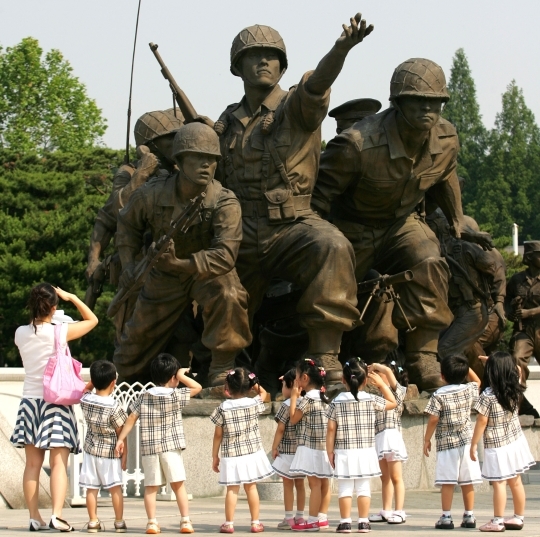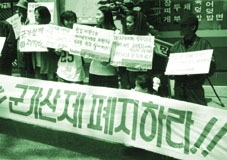Is it worth to sacrifice constitutional rights to equality in order to benefit a mere 50 people a year?
The National Assembly consistently attempts to revive the abolished military extra-point system, sparking serious controversy and social conflict

Since 2004, when the 17th National Assembly opened, the National Assembly’s National Defense Committee has been making incessant attempts to reintroduce the system that gives extra credits to male job seekers for their military service, questioning the lawmakers’ compliance with the Constitution. The bigger question, however, is whether they grasped the nature of the system before they raised their voice for fair compensation for military duty. Put differently, they seem to be making a mistake, seeing just trees and not the forest. Similarly, the Ministry of National Defense appears to be blindly supporting the system. First, there is the Defense Minister Kim Kwan Jin, who is pushing the reintroduction of the system more aggressively than his predecessors. Then there is Choi Yoon-hee, Chairman of the Joint Chiefs of Staff, who voiced his support for the system during his confirmation hearing held on October 11.
Bill proposed by Rep. Han Ki-ho rewards all men discharged from military?
The military duty incentive system was abolished in 1999 after the Constitutional Court ruled that it violated equal rights and the principle of proportionality. In November 2012, Representative Han Ki-ho of the ruling Saenuri Party, former three-star army general, and 11 other lawmakers proposed a bill, currently pending in parliament, to revise the Military Service Law, reigniting controversy over the system. Under the bill, honorably discharged soldiers would receive extra points up to 2% of the score earned in each subject matter of civil service examinations. The proportion of those who pass the exam with extra points must not exceed 20 percent of total recruits. Also, a presidential decree will be imposed to prevent the abuse of the granted extra points. In order to make sure those who are hired with the extra credits do not get more advantage than the bonus points, their military service time will not be factored into their pay.
Nevertheless, the amended bill hardly supplements the abolished system in terms of the proportionality principle. Attempts to put an end to the long-standing controversy over the system simply by reducing the bonus points from five to two shows how shallow the lawmakers’ understanding is.
First of all, the extra point system does not reward all the 250,000 soldiers discharged every year. Rather, it grants incentives only to a small number of people. Provided that about 1,000 of the 250,000 men apply for public service exams, at most, 50 applicants will benefit from the system. Some argue that women will also be the beneficiary of the system as the number of female soldiers is on the rise. According to the Ministry, women accounted for only about 1.3 percent of the nation’s armed forces in 1999, but the figure has risen to 4.5 percent in 2012. Still the number is very small, and it is unlikely that women who chose to be a soldier as a profession will later apply for 7th•9th civil service exams.
Second, the extra point system could serve as a ground for other legislation designed to help people who feel relatively deprived, expected to trigger more wasteful debates and conflicts. For example, the bill proposed by Shin Eui-jin, a lawmaker of the Saenuri Party, calls for giving 2 percent extra points to mothers when applying for jobs. This bill met with vehement opposition not just from men but from women themselves as such incentive could result in reverse discrimination against men and women without childbirth or childbearing experiences.

US extra point system is completely different
Third, proponents of the military duty incentive system have often quoted a similar system of the US to back their argument. However, the US system is different in essence from the extra point system of South Korea. First of all, the extra point system of the US is a part of the Veterans’ Preference System. According to Kang Seon Mi, an expert in women’s studies, under the Veterans’ Preference System, only those who actually served in a war including honorably discharged veterans, fallen soldiers, and wounded veterans receive advantages in public employment. Moreover, the federal and state employment tests in the United States are totally different from the civil service exams in Korea. In the United States more than 80 percent of the public officers are hired through various means including written tests. Scores on written tests account for a meager part of the whole assessment of applicants. As such, the advantages given to veterans in the U.S. are not decisive enough to determine one’s passage of the exams. Still, women and disabled people in the U.S. have long raised issues with the veterans’ preference system, and the U.S. Equal Employment Opportunity Commission (EEOC) once stated that the system adversely affects the employment opportunities of women.
Then why do the Defense Ministry and some lawmakers continue to hold up the military extra point system as the primary compensation for discharged veterans despite its essential flaws? The answer may lie in the symbolic meaning of the system, the absolute preference that goes beyond equal rights.
Simulation of how the system works
Acceptance rate for men, 9.4p%↑for 9th grade level· 11.7%p↑for 7th grade level
Let’s look at how the bill of Rep. Han Ki-ho will change the ratio of men and women to be hired by government.
The simulation conducted by the Ministry of Security and Public Administration found that the number of men who pass the exam of the 7th grade level will jump by 26(11.7%p↑) from 113(50.9%) to 139(62.6%), whereas the number for women will fall by 26(11.7%↓) from 109(49.1%) to 83(37.4%).
As for those who apply for the 9th grade level civil service exam, the figure for men will go up by 27(9.4%p↑) from 133(46.5%) to 160(55.9%), while the number for women will decrease by 27(9.4%p↓) from 153(53.5%) to 126(44.1%).
The figures might seem trivial now, but they could not be ignored later on, given the increasingly stiff competition for government jobs.

